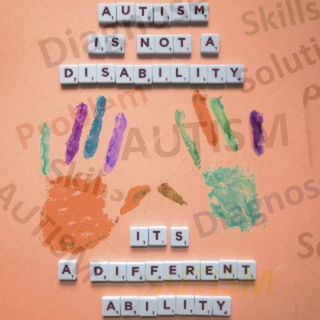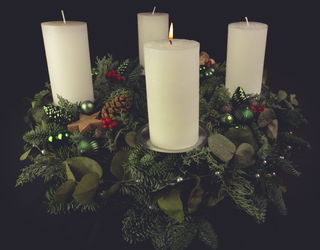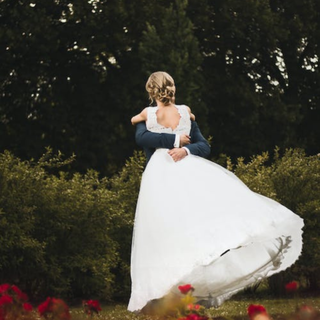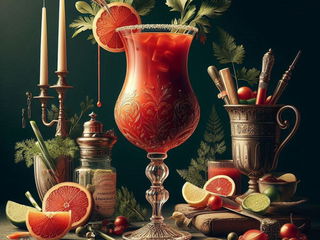- Calendar
- Calendar 2025
- December
- Holiday Christmas Day
Christmas Day
Holiday
Christmas Day in the United Kingdom is celebrated on December 25.
In 2024, Christmas Day is on a Wednesday.
Christmas is a religious, cultural, and commercial holiday, a day when most Brits spend time with family and friends, exchanging gifts and sharing meals. It is a public holiday, so most shops and businesses are closed.
Christmas Traditions
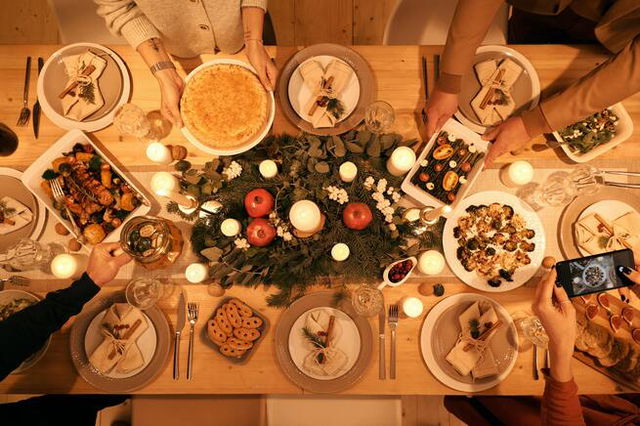
Christmas Dinner
The famous Christmas Day dinner can vary greatly from family to family. Typical dishes on the menu include meats such as turkey, ham, goose, or pork. Side dishes such as mashed potatoes, pigs in blankets, roasted root vegetables, stuffing, gravy, and cranberry sauce. This is followed by desserts such as Christmas pudding, or maybe sponge and custard. Some typical seasonal drinks are eggnog, cider, mulled wine, punch, and hot chocolate.
Of course, Christmas dinner would not be complete without a Christmas cracker, complete with a terrible joke, a terrible toy, and a paper hat.
What does Santa pay once a month?
Jingle Bills!
Having Fun
Fun activities include going to ballets or maybe a pantomime, enjoying old movies on TV, watching the Queen's/King's Christmas speech, playing board games, and listening to carol singers. In some local communities, nativity plays, concerts, performances, and tree-lighting ceremonies take place.
Towns and churches are decorated with nativity scenes incorporating baby Jesus, Mary, Joseph, animals, shepherds, and angels.
Churches hold Christmas Eve candlelit or midnight services. Carol singers go from house to house. People decorate their homes with lights and displays outside, and light their Christmas trees and other decorations inside. Children especially look forward to receiving gifts on Christmas morning, and Santa Claus coming down the chimney to deliver them the night before. Some people volunteer to help out at homeless shelters or engage in other charitable work.
The Christmas Tree
The Celts and Druids in Europe saw evergreens as symbols of eternal life and would decorate their homes with them to revive the dying sun of midwinter. They would also burn a Yule log. Mistletoe was sacred and held magical powers. In Scandinavia, if enemies met under mistletoe trees, they would lay down their weapons and give each other a kiss of peace. In medieval Germany, people honoured Adam and Eve with a feast on December 24, decorating a paradise tree with apples and wafers. Candles were also used as decorations, symbolizing Christ. German settlers brought the custom to North America, but it was German Prince Albert and Queen Victoria of England w#ho popularized the tradition during the 19th century.
Santa Claus
The legend of Santa Claus mostly came from the ancient stories of Saint Nicholas, a fourth-century bishop who helped the poor and sick. In the late 18th century, Dutch immigrants in New York gathered to commemorate his death. Their nickname for him was Sinter Klaas. Over the decades, the character known as Santa Claus began to take shape, with retail, poems, and illustrations contributing to his well-known image and story.

Origins of Christmas
The ancient peoples of Europe would perform midwinter ceremonies, around the winter solstice, to mark the rebirth of the sun, when the days would start to get longer again. The Scandinavians had Yule, burning a log and feasting for as long as it burned. The Romans followed Saturnalia, a week-long hedonistic feast involving drinking, merrymaking, gift-giving, and also decorating homes with evergreens. People threw standards and norms aside: peasants would take over the city, masters would become slaves, men would dress as women, etc. The feast culminated in the birthday of Mithra, the sun-god, December 25. On December 25, 274, the sun-god was named the principal patron of the Roman Empire and a temple was dedicated to him in the Campus Martius.
Emperor Constantine of the Western Roman Empire converted to Christianity in 313 AD and granted legal recognition to the religion. In an effort to unite his empire, he merged Christian and pagan festivals. The book The Paganism in Our Christianity states: “It was a definite Christian policy to take over the pagan festivals endeared to the people by tradition, and to give them a Christian significance”. The Roman Church held its first official observance on December 25, 336 AD. This is thought to be the first recorded Christmas celebration.
With the rapid spread of Christianity throughout the Roman Empire, Christmas also spread. By the 8th century, most of Europe celebrated it, although Easter was more important. It began to take on more of the merrymaking features of the northern European festivals. In the Middle Ages, Christians attended church to worship on the day, but other rites were far from holy. For example, the poor would go to the homes of rich people to demand their best food and drink, vandalizing the homes of any who refused.
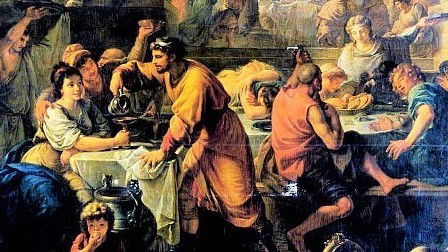
Because of its pagan origins and boisterous customs, the Puritan-led government in England banned Christmas in 1644. The Puritans in New England followed suit, and it was banned from 1659 to 1681. Offenders were liable to a fine of five shillings. However, other parts of the country continued to observe it. In the 19th century, the portrayal of Christmas in modern literature, the customs of immigrants, and religious customs gave shape to the popularity of the day for the family.
Christmas facts
- It is likely that Jesus was born sometime in spring and not December. The Jewish month of Chislev (November/December) was a time for cold and rainy weather. Shepherds and their flocks would not have been living outside at night. Plus, Joseph and Mary travelled to Bethlehem because of a decree by Caesar Augustus, who was particularly hated by the Jews. He would not have wanted to stir up even more anger against him by ordering people to travel in winter.
- The Bible does not mention that 3 wise men visited Jesus at the manger on the night of his birth. It states that astrologers, or magi, came from eastern parts, without specifying their names or number. It says that they visited the infant, or young child, in his house, some months later.
The Best Christmas Movies
One of the most popular activities at Christmas is sitting around the TV and watching a family-friendly film. There are of course so many great Christmas films out there that this list could be thirty times longer, but here are five of the best Christmas films:
1. It’s a Wonderful Life
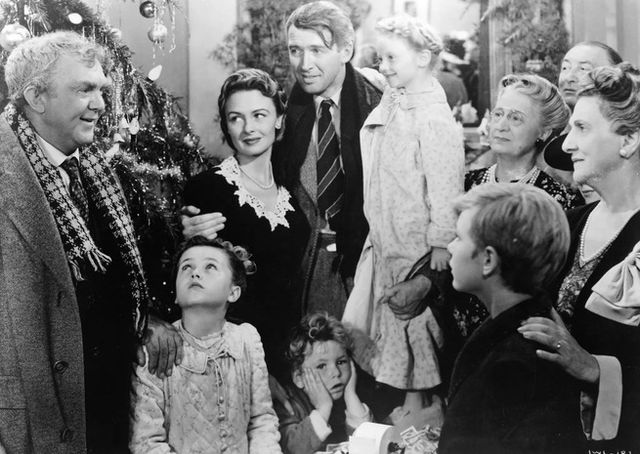
One of the greatest feel-good films of all time, following the story of George Bailey, a kind family man on the brink of committing suicide because of situations outside his control. He is brought back from the edge by his guardian angel, Clarence, who shows him why his life has value and is worth saving. Warning, this film has a magical ending that will reduce anyone to a puddle of tears.
2. Miracle on 34th street
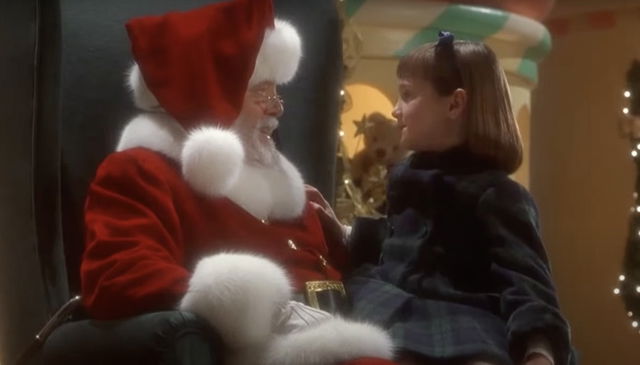
Do you believe in Father Christmas? In Miracle of 34th street, Kris Kringle gets a job in a toy shop in New York. He's not just good on the job, he's uncannily good at it. The problems begin when he starts telling people that he is the real Father Christmas, and people begin to question his sanity. Kris Kringle's innocence and the fate of Christmas itself hang in the balance. The modern version of the film from 1994 is perhaps now the most well-known, but if you have the time the original from 1947 is also well worth watching.
3. Die Hard

Is it or isn’t it a Christmas film? This question has perhaps been debated too many times, and for too long! While it may not deal with the most Christmassy of themes, there's no denying that this film is constantly present at Christmastime. It always features in the Christmas schedule, and the film itself is also set around Christmastime. Maybe for these reasons alone, there's something festive about watching Bruce Willis leaping into action and saving the day.
4. Elf
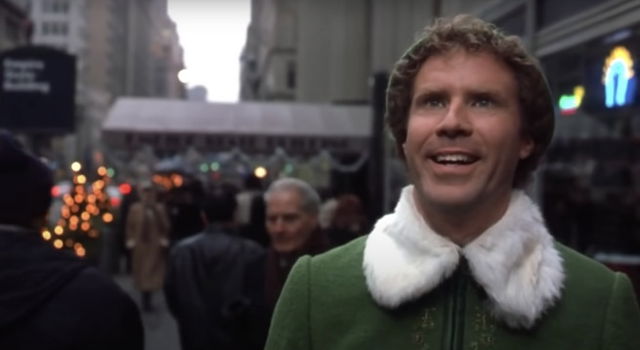
A film to make the whole family laugh. Will Ferrell plays the role of Elf, who is sent out from Santa's workshop in order to find his biological father. Along the way, he makes friends, has entertaining antics, and saves Christmas for millions of Americans.
5. Home Alone
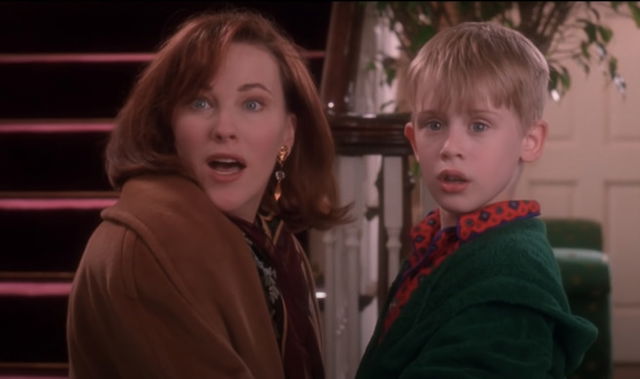
A film that makes you half laugh out loud, and half cringe at the unlucky burglars who decide to break into a home where child Kevin McCallister is spending Christmas alone having been forgotten and left by his family. Kevin proves to be more than a match to the burglars as he sets unbelievable traps which leave those burglars wishing they had never set eyes on the property.
Bonus Extra: The Muppet Christmas Carol
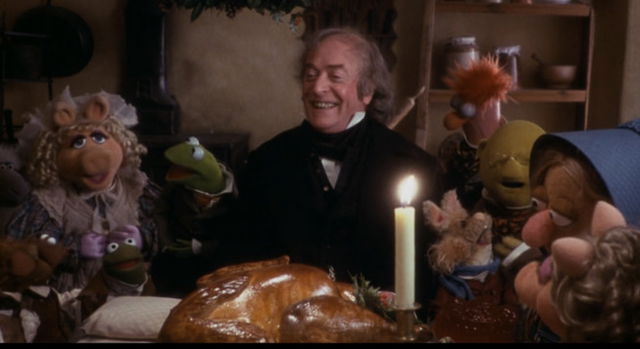
Charles Dickens probably had no idea how global or influential his story A Christmas Carol was going to become when he wrote it in 1843. While there are many famous and excellent adaptations of it for film there is something magical, special, and family-friendly, about a cast of muppets, including Kermit the Frog and Miss Piggy sharing the screen with acclaimed actor Michael Caine.
What day is Christmas?
Christmas Day is always on December 25, the day after Christmas Eve. However, what day of the week Christmas falls on changes each year. Below you can see what day Christmas will be on, and the dates of Christmas past:
- Christmas Day 2024 - Wednesday, December 25
- Christmas Day 2025 - Thursday, December 25
- Christmas Day 2026 - Friday, December 25
- Christmas Day 2027 - Saturday, December 25
- Christmas Day 2028 - Monday, December 25
Can’t wait until Christmas? Get into the spirit and share this fun Christmas Countdown with family and friends!

Other Celebrations
-
Jan 07 Tue
-
Feb 02 Sun
-
Nov 05 Wed
-
Dec 21 Sun
-
Dec 24 Wed
-
Dec 26 Fri

Christmas Day - Next years
Friday, 25 December 2026
Saturday, 25 December 2027
Monday, 25 December 2028




